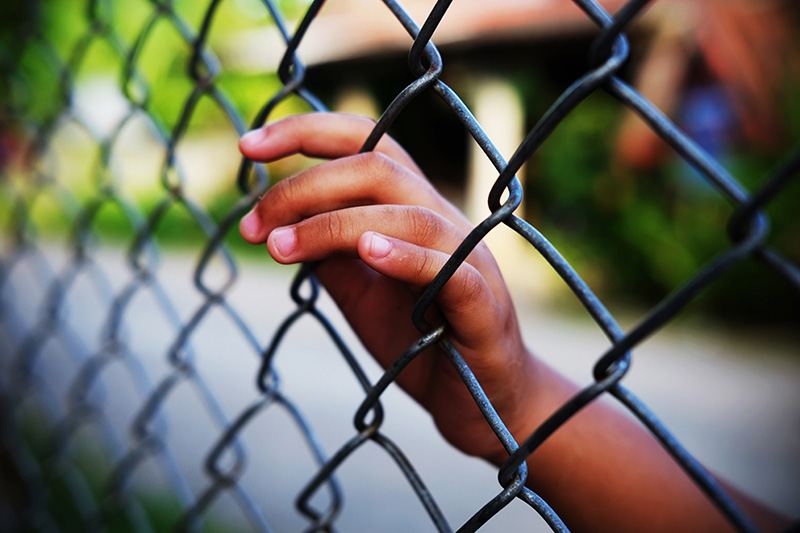The University of Queensland’s TC Beirne School of Law will host a group of leading Australian academics on July 19 for a workshop on ‘crimmigration’ in Australia.
‘Crimmigration – Law, Politics and Society’ will unite, for the first time, socio-legal scholars to contribute interdisciplinary research papers that address the meaning and field of contemporary crimmigration law and practice.
 The roundtable meeting will examine, broadly, the intersection of criminal law/enforcement and immigration law/enforcement, exploring the reasons underpinning the merger, and its consequences.
The roundtable meeting will examine, broadly, the intersection of criminal law/enforcement and immigration law/enforcement, exploring the reasons underpinning the merger, and its consequences.
Workshop host Associate Professor Peter Billings said that the concept and application of crimmigration had been subject to careful and sustained scrutiny by social scientists in Australia for some time.
“This body of work could be complemented by scrutiny by socio-legal scholars,” he said.
“Crimmigration laws and practices are expanding, and the use of crimmigration controls is accelerating in Australia, and globally.
“This includes the ways in which immigration law, policy and practice is used as a means of preventing future crimes or mitigating risky behaviours from eventuating.
“It also includes laws that criminalise irregular migration, and those who facilitate irregular migration, such as people smugglers, and human traffickers.”
Particular aspects of crimmigration will be examined from a variety of critical perspectives, including the use or regulatory (administrative) crime control measures (such as detention and deportation), and the criminalisation of non-citizens and refugees in Australia with a focus on the lived experiences of those captured by crimmigration law and practice.
“Crimmigration laws capture an increasingly broad spectrum of non-citizens; not just those who have committed heinous crimes, such as murder or serious sexual offences, but also those with more modest criminal histories – people who may have committed minor traffic offences or those with convictions for drug related offences,” Associate Professor Billings said.
“Of late, Australia has increasingly been detaining and removing people who are long-term permanent residents, or ‘virtual nationals’ – people who been living here for decades, since early childhood in many cases, and some of them have committed relatively minor offences,” he said.
“This gives rise to issues of proportionality and can cause family separation, and emotional and social hardship for individuals when they are returned to countries with which they have little or no connection.”
“Among many other issues, we are looking at the ways in which immigration laws and processes effectively punish people, and how detention centres are punitive in key respects, and how the pains of immigration detention are different, and in some ways more acute, than for those serving a custodial sentence in prison.”
Associate Professor Billings said the socio-legal scholars attending the workshop would present their papers and exchange ideas at the workshop and the meeting would result in the publication of an edited book (published by Springer) early next year.
“Some of the discussion will be forward looking, with contributors advancing ways that might be considered fairer - substantively and procedurally - and more consistent with human rights obligations, while also meeting the government’s regulatory concerns about risks to public safety,” he said.
Human trafficking and migrant smuggling expert and TC Beirne School of Law researcher Dr Andreas Schloenhardt will be contributing a paper on anti-smuggling laws to the edited collection and exploring how these laws and related practices fit within contemporary crimmigration in Australia and beyond.
“Migrant smugglers are a symptom not the cause of irregular migration and more needs to be done to understand and address the complexities of refugee movements and enhance human mobility,” he said.
“Very few asylum seekers are able to reach Western nations because of the lack of safe and regular avenues for migration and resettlement places.”
Find out more about the TC Beirne School of Law’s research in human trafficking and refugee law.
Media: Associate Professor Peter Billings, +61 7 3365 7176, p.billings@law.uq.edu.au.
Contributors to the crimmigration project are:
Patrick van Berlo PhD candidate at the Institute for Criminal Law and Criminology at Leiden Law School, The Netherlands
Dr Louise Boon-Kuo Lecturer at the University of Sydney Law School
Dr Peter Chambers Senior Lecturer in the School of Global, Urban, and Social Studies at RMIT
Professor Mark Finnane is Professor of History and ARC Laureate Fellow at Griffith Criminology Institute, Griffith University
Associate Professor Alison Gerard, Director of the Centre for Law and Justice at Charles Sturt University
Associate Professor Cesar Garcia Hernandez, Sturm College of Law, University of Denver.
Khanh Hoang Senior Protection Assistant at the United Nations High Commissioner for Refugees
Dr Andy Kaladelfos is a Senior Research Fellow, Historian and Criminologist at the Griffith Criminology Institute, Griffith University.
Professor Susan Kneebone Professorial Fellow at Melbourne Law School, The University of Melbourne.
Dr Monique Mann Vice Chancellor’s Research Fellow in Technology and Regulation at the Faculty of Law, Queensland University of Technology.
Associate Professor Marinella Marmo College of Business, Government and Law at Flinders University
Associate Professor Greg Martin, School of Social and Political Sciences, University of Sydney, Australia
Dr Amy Nethery Senior Lecturer in Politics and Policy at Deakin University
Dr Kate Ogg Senior Lecturer at the School of Law, ANU.
Professor Andreas Schloenhardt Professor of Criminal Law in the School of Law at The University of Queensland in Brisbane
Dr Anthea Vogl Lecturer in Law at the University of Technology Sydney



